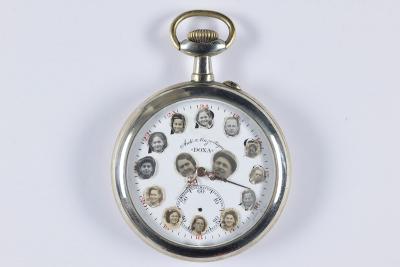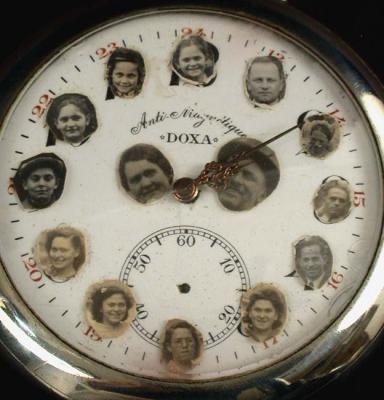Following the death of his wife Feiga, Yeshayahu Markovitz was left to raise their seven children. He married Esther, and they had five more children. The family, which lived in Szilágysomlyó, in the area of Transylvania that was annexed to Hungary in 1940, followed a traditional religious way of life. Yeshayahu carried a special pocket watch that enabled him to see all of his family each time he checked the time. In the center are photographs of Yeshayahu and Esther, and the twelve children’s photos are pasted around the face of the watch in order of birth: Gyula, Lili, Zelig, Licu, Manci, Ruki, Babi, Frimi, Duvid, Krindi, Beri and Aidu.
In 1942 the two oldest sons, Gyula and Zelig were drafted into the labor battalions of the Hungarian army. Another son, Licu, served as an army driver on the eastern front. Their eldest daughter, Lili (after her marriage, Lili Baruch) lived with her family in Koloszvar. In 1944 the Markovitz family members were driven out of their home in Szilágysomlyó. They were given two hours to vacate their home with instructions to leave all jewelry and valuables behind. Before departing, Yeshayahu entrusted the pocket watch to a Christian friend. The Markovitz home was subsequently stripped of its contents. A ghetto was set up in a brick factory near the town, and the family was incarcerated there together with Jews from the entire area. After close to a month, the Markovitz family was deported on the first transport to Auschwitz.
Upon arrival at Auschwitz-Birkenau in June 1944, Yeshayahu and Esther and their two youngest children, Beri and Aidu, were murdered. Those selected for work stayed in the camp. As men and women were separated, contact between 16-year-old David and his five remaining sisters was cut off. In her testimony, Ruki (Rachel) relates how she found her brother David when she was part of a work detail that passed the men’s camp. By calling his name and the name of the town through the fence, she was able to locate him. One day, he even attempted to throw some bread to her but it got caught on the fence. In October 1944, the Marcovitz sisters were selected for transport to a labor camp but the youngest, Krindi, didn’t pass the selection that took place as they were about to leave the camp, and was sent to her death. In her testimony Rachel relates that though the sisters had sworn that they would stay together no matter what, the guards would not allow Krindi’s sisters to join her. The four remaining sisters were sent to the Mittelsteine camp in the Sudetenland to work in a factory manufacturing airplane components. After seven months of forced labor they were taken on a death march, which they survived thanks to their insistence on sticking together.
After the liberation they returned to Budapest rather than returning home, out of fear of the reputation of the Soviet soldiers. The three brothers who had survived the war in the Hungarian army and labor battalions returned home, and the pocket watch that had been entrusted to their neighbor was returned to them. The four sisters: Manci, Rachel (Ruki), Babi and Frimi immigrated to Eretz Israel, instructing David, who was in Italy at the time, not to bother returning home. After joining them in Israel, David served in the Israel Defence Forces, and later immigrated to the United States.
Yad Vashem Artifacts Collection
Loaned by David Marks, Sherman, Connecticut, U.S.A








